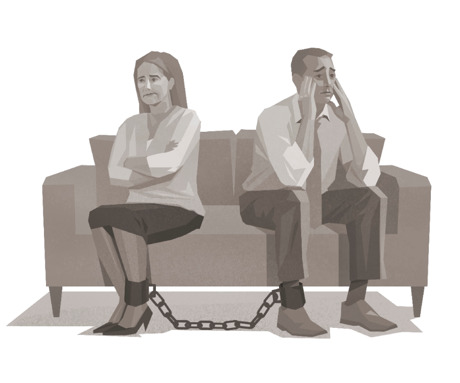THE CHALLENGE
WHY IT HAPPENS
Reality sets in. The daily routine of working, raising children, and dealing with in-laws can chip away at marital bliss. Additionally, unexpected problems—perhaps a financial setback or caring for a family member who suffers from a chronic illness—can strain a marriage.
Differences seem irreconcilable. While dating, couples tend to overlook differences. Once married, though, a man and woman discover just how unalike they are in such areas as communication styles, money management, and problem solving. Differences that once were merely an annoyance may now seem intolerable.
You have become emotionally distant. Over time, a buildup of unkind words or actions and a backlog of unresolved conflicts can cause a husband or wife to withdraw into an emotional shell or, worse yet, begin to form an emotional attachment with someone else.
Your expectations were unrealistic. Some people walk into marriage believing that they have found the one person they were meant to be with. While that notion may seem romantic, it can be a setup for disaster. As soon as problems arise, the myth of the “perfect match” is shattered, leaving both spouses with the feeling that they made a mistake.
WHAT YOU CAN DO
Focus on your spouse’s good qualities. Try this: Write down three positive qualities that your mate possesses. Keep the list with you, perhaps on the back of a small wedding picture or in a mobile device. Regularly refer to this list as a reminder of why you married your spouse. Focusing on the positive qualities of your mate promotes peace and will help you put up with your differences.—Bible principle: Romans 14:19.
Plan special time together. Before you were married, likely you both set aside time to do things together. Dating was new and exciting, but it was not left to chance. Why not do something similar now? Plan occasions where you and your spouse can spend special times together, as if on a date. Doing so can help you draw closer to each other and enable you to cope better with life’s unexpected problems.—Bible principle: Proverbs 5:18.
Discuss your feelings. If you have been hurt by your spouse’s words or actions, can you overlook the matter? If not, do not play games by resorting to the silent treatment. Calmly talk things out with your mate as soon as you can, that very day if at all possible.—Bible principle: Ephesians 4:26.
If you have been hurt by your spouse’s words or actions, can you overlook the matter?
Discern the difference between your feelings and your spouse’s intentions. Likely neither one of you ever intends to hurt the other. Assure your spouse of this by sincerely apologizing for any hurt feelings you may have caused. Then discuss what specific things you both can do to avoid unwittingly causing hurt feelings. Follow the Bible’s advice: “Become kind to one another, tenderly compassionate, freely forgiving one another.”—Ephesians 4:32.
Be realistic in your expectations. The Bible acknowledges that those who marry “will have tribulation.” (1 Corinthians 7:28) When you experience such tribulation, do not hastily conclude that your marriage was a mistake. Instead, work with your mate to resolve differences and “continue putting up with one another and forgiving one another freely.”—Colossians 3:13.




No comments:
Post a Comment